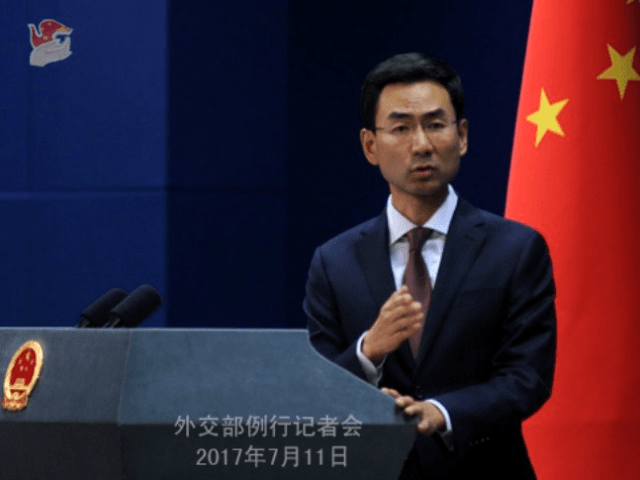The Chinese Foreign Ministry issued an exasperated response to a question about North Korea on Tuesday, demanding that those holding Beijing responsible for propping up the Kim Jong-un regime in North Korea stop.
“As we said repeatedly, the crux of the Korean nuclear issue rests on the conflict between the DPRK and the US and it is in essence a security issue,” spokesman Geng Shuang told reporters. “The Chinese side is neither the focal point of the conflict of the Korean nuclear issue nor the catalyzer for escalation of tensions at present, and it does not hold the key to solving the Korean Peninsula nuclear issue.”
Geng went on to accuse “certain people,” without naming them, of “exaggerating and playing up the so-called ‘China responsibility’ theory. Those people have either failed to grasp the Korean Peninsula nuclear issue comprehensively and accurately, or done [sic] this out of ulterior motives with an attempt to shirk responsibility”:
It won’t help to absolve oneself of responsibility, or kick down the ladder, still less stab in other’s back. If when China is busy putting out a fire while someone pours fuel on it, when China is faithfully following through on Security Council’s resolutions while someone attempts to infringe upon China’s legitimate rights and interests, and when China is working vigorously to advance the denuclearization of the Korean Peninsula while someone seeks excuse to endanger China’s security interests, then how can China’s efforts work out as expected? How can the situation be eased? And how can the Korean Peninsula nuclear issue be resolved?
“Enough of the so-called ‘China responsibility’ theory on the Korean Peninsula issue,” Geng concluded.
The rant during the Foreign Ministry’s regular press briefing is a sign that the Chinese government may be feeling the pressure from the international community, spearheaded by a Trump White House that has repeatedly accused China, North Korea’s largest trading partner, of not taking enough of an initiative to contain the threat of a nuclear Pyongyang.
Before meeting with President Xi Jinping at the G20 summit last weekend, President Donald Trump lamented Beijing’s growing trade with North Korea on a Twitter post that read, “Trade between China and North Korea grew almost 40% in the first quarter. So much for China working with us—but we had to give it a try!”
Following the meeting, United Nations representative Nikki Haley threatened China with economic consequences if its government continued to profit off of trade with North Korea. On Sunday, Haley said, “I think there are a lot of options on the table when it comes to dealing with China. The ball is in their court.
“They’re either going to go along with us and the rest of the international community and say, yes, we think that what North Korea did was wrong or they’re not. The president knows what all his options are.”
“I think there will be a response if they don’t go along with that,” she concluded. “The president has made it clear that he will start looking at trade relations with China.”
The United States Treasury Department recently sanctioned the Chinese Bank of Dandong for conducting business with the North Korean regime, violating international sanctions. While Secretary of the Treasury Steven Mnuchin clarified that the sanctions are “in no way targeting China,” as a communist government Beijing has a hand in all business ventures within its borders.
The Chinese government did not issue a stern response to the sanctions, however. Instead, following the announcement and subsequent North Korean launch of what they claimed to be an intercontinental ballistic missile (ICBM), the Chinese government condemned the launch and called for dialogue.
“China finds this launching unacceptable,” UN representative Liu Jieyi said last week. “We strongly urge the DPRK [Democratic People’s Republic of Korea] to strictly abide by the resolutions of the Security Council and put a stop to any rhetoric and action that might further exacerbate the tension on the Peninsula.”

COMMENTS
Please let us know if you're having issues with commenting.